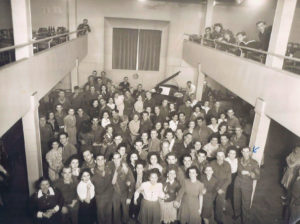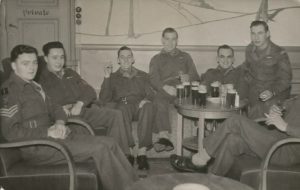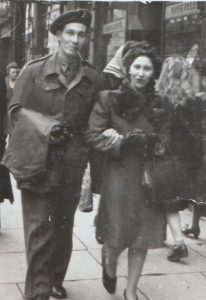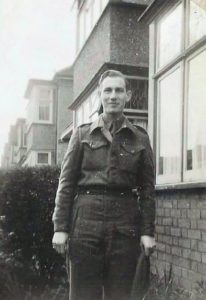75th commemoration of the Liberation of Bergen-Belsen – one man’s story, Stanley’s story
Stanley, Rachel Posaner’s grandfather, was part of the British forces involved in the liberation of Bergen-Belsen. Share his story.
 The annual National Commemoration of Yom Hashoah was planned for the 20th of April 2020 to mark the 75th anniversary of the end of the Holocaust and the Liberation of Bergen-Belsen. This year, as consequence of Covid 19 and social isolation, the event was commemorated virtually. This blog shares the story of one man who was a witness to the horrors of Bergen-Belsen in the early days of its liberation.
The annual National Commemoration of Yom Hashoah was planned for the 20th of April 2020 to mark the 75th anniversary of the end of the Holocaust and the Liberation of Bergen-Belsen. This year, as consequence of Covid 19 and social isolation, the event was commemorated virtually. This blog shares the story of one man who was a witness to the horrors of Bergen-Belsen in the early days of its liberation.
On the 15th of April 1945 British forces liberated Bergen-Belsen where they found around 60,000 prisoners most of them seriously ill and thousands of corpses lay unburied in the camp grounds. Between May 1943 and April 1945 up to 37,000 prisoners died there and more than 13,000 former prisoners, too ill to recover, died after liberation. During its existence approximately 50,000 prisoners died at Bergen-Belsen, most of them Jews and included Anne Frank and her sister Margot. After evacuating Bergen-Belsen, British forces burned down the whole camp to prevent the spread of typhus. The surviving prisoners were found in appalling conditions, they were acutely sick and starving, they had been without food and water for days and were dying at a rate of around 500 a day, mostly from typhoid.


In recognition of the 75th Anniversary, we want to share the story of Stanley Fisher, a 95 year old Jewish veteran of the Second World War, who served in the British Army from 1942-1947. He saw first-hand the consequences on the people who were liberated from Bergen-Belsen in April 1945. Stanley Fisher is the grandpa of Rachel Posaner who works is the manager of the Knowledge & Evidence Service (KES) at the Health Services Management Centre (HSMC). He is a remarkable man who I had the privilege to interview for the purpose of writing this blog in February 2020.
Stanley was born in and raised in West London into an established Jewish family, his father and grandfather had both been involved as founding members of Synagogues. He is a father, grandfather and great-grandfather who co-founded the Solihull synagogue and is a member of the Singers Hill Synagogue, Birmingham. It wasn’t until much later in his life that Stanley shared the experience he had in 1945. This was first initiated when he was invited to attend an event to mark the Holocaust at Solihull School to hear a survivor speaking about their experience, he felt strongly that these events should not be forgotten.
In June 2019 he attended his great grandson’s Bar Mitzvah and it was during a celebratory breakfast party afterwards that he was interviewed by Jonny Gould, a family member, about his war time experiences and, in particular, what he witnessed at the Bergen-Belsen concentration camp during its liberation in 1945. Stanley had been plagued by nightmares and couldn’t speak about what he saw 75 years ago, however this interview facilitated the way for Stanley to start to voice his story, to add to those of the remaining survivors and liberators as a testimony to those who died during the horror that was the Holocaust, so that future generations would not forget. This is Stanley’s story…..
Stanley Fisher, the eldest of three children, was born and raised in West London. His formative years were spent living with his grandma or “bubba” as she was known to him, so that he could continue his schooling at the prestigious Latimer boy’s school. However, the Fisher family had financial difficulties, so at the age of only 14 ½ Stanley had to leave school, giving up his aspirations to become a Doctor, to go and work or his cousin’s exporting business, where he earned a respectful £1 a week, the average family wage at that time being £3 a week.
At the age of 18, and with the outbreak of war in Europe, Stanley was conscripted into the British army, where he remained until 1947. He was enrolled in the 2nd 6th East Surrey Training Regiment after which he was enrolled in the 4th Battalion Wiltshire Regiment and made his way across Europe, his battalion arrived in Arromanches, France, in the week of the D-Day landings he fought at Arnhem and moved on until he was stationed not far from Bergen-Belsen, in the town of Cele. Stanley was not a member of a Jewish regiment in the Army, however there were 60,000 British Jews who fought for their country during 1939-1945. Stanley was one of the first British soldiers to see Bergen-Belsen upon its liberation, but never spoke about his experience until recent years.
During the Second World War and coming from a Jewish family in London they had some knowledge that things were difficult for Jewish relatives in Europe, but they were not aware of the enormity of what was happening to the Jewish people, nothing could prepare him for what he was about to witness. In April 1945 stationed not far from the camp, Stanley asked for permission from his commanding officer to go to Bergen-Belsen, permission granted, he got on his motorbike but was not prepared for what he saw
“I was completely shocked, feeling very sick. It was horrible, horrific. Afterwards we found out it wasn’t a death camp, it was a working camp. A lot of young people I spoke to who had been working in the factories had moved out to houses in the area. They (the inmates) were actually starved to death – there were no gas chambers – it was diabolical it was the most horrific thing I have ever seen in my life.
The authorities had already started moving survivors out to other barracks which was down the road and they were walking skeletons, I’d never seen anything like it, I had nightmares for years. I never spoke about it to my family for years…”
The memory of what Stanley had seen that day would stay with him, he went back to his battalion and was soon transferred to Brussels working in logistics and collating statistics. It was here that he became involved with a Jewish club, in Brussels, who were members of GHQ (General Head Quarters) in the Army. On Friday nights they would celebrate the Jewish Sabbath, with an evening meal, and then join in a social event, but he never talked of the horrors he had seen.
I asked when was the next time he thought about Bergen-Belsen and what was happening there?
“It never left me, I mean, wherever I went it was always with me, especially at nights, it was always there”
Stanley never talked to anyone about his experiences until later in life. He now feels strongly that this event must not be forgotten and with the remaining survivors ageing the story must be told. ‘I’m only doing this now because I realise the story must never be forgotten, it’s got to be told’
I asked Stanley why this is important now, and he said
“If you look around anti-Semitism is on the rise again and it’s got to be stopped somehow –
We don’t want any anti-Semitism – anti-Muslimism we want peace”.

On a personal level, by the time he was called up for army duty, Stanley had already met and fallen in love with his “sweetheart” Evelyn Goodman, a family friend. Later, in a Euston alleyway that was stinking of urine, Stanley would ask Evelyn to wait for him, and wait for him she did. Evelyn and Stanley, her “toy boy” as she always referred to him, got married in Shepherd’s Bush Synagogue in 1946. Their marriage lasted for an amazing 73 years until Evelyn’s death last year at the amazing age of 97!
After leaving the army Stanley worked at his brother-in-law’s manufacturing chemist for a time until he, Evelyn and their three children, left London to live in Solihull in the 1960s where he worked for Fillery’s Toffee in Tyseley. The Fisher family stayed in Solihull for a number of years until Stanley’s redundancy made them up sticks and head back to London, where he worked for his sister and brother-in-law as a Director in a stationery business, until he retired.
Stanley returned to Solihull in 2002 has spent his retirement being involved in cultural groups, playing bowls and bridge and spending time with his friends and family, including his then 96 year old father. He was also actively involved in the Jewish community as he was, and still is, an avid Synagogue attender. In London he was on the Council at Pinner Synagogue, as well as the Board of Deputies, and in the early 2000s, having moved back to Solihull, he was made Life President of the Solihull and District Hebrew Congregation, for which he was a co-founder. Even now, at the age of 95 he is still an active member of the Birmingham Singers Hill Synagogue, where he both attends and participates in the running of the services.
However, it is his spending time with his three children, five grandchildren and 14 great grandchildren that gives Stanley most pleasure in life. Sitting at the top of the table during the Passover meal, as patriarch of his family, is what makes Stanley come alive. It is this that he is most proud of and it is for them, the future generations, that Stanley shares his story …


Maureen Smojkis, Lecturer in Mental Health, Department of Social Work and Social Care
Rachel Posaner, Manager, Knowledge & Evidence Service (KES), at the Health Services Management Centre (HSMC)
